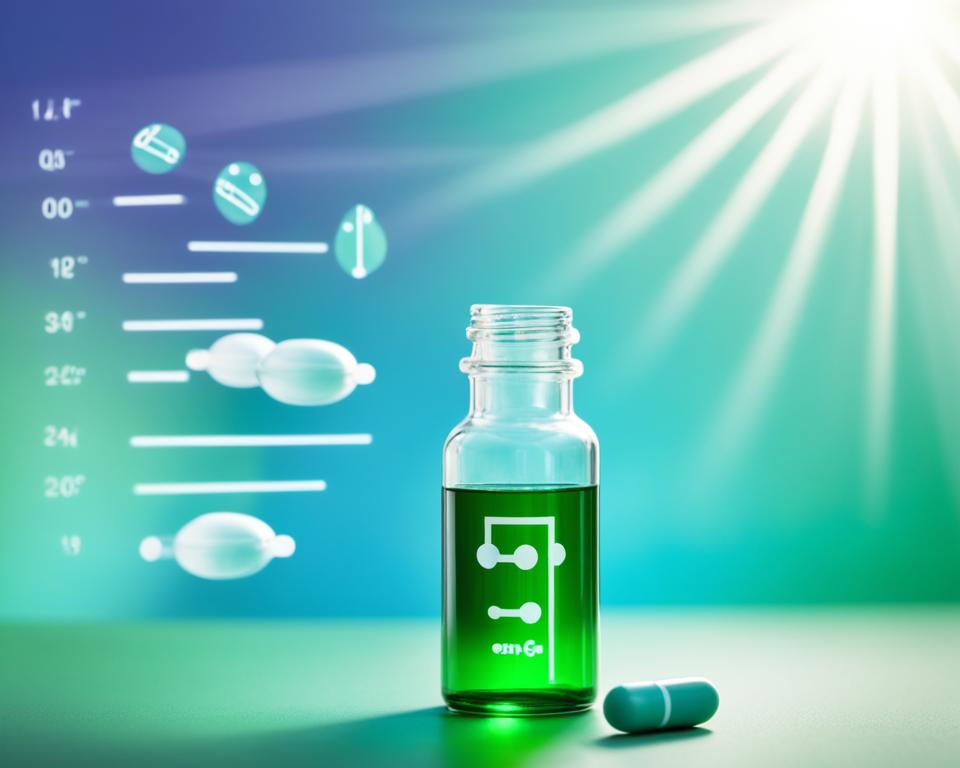Spironolactone, a widely used medication, offers a range of benefits for various medical conditions. This versatile drug has proven effective in managing hypertension, treating acne, and addressing other health issues. Let’s delve into the diverse applications and advantages of spironolactone.
Key Takeaways:
- Spironolactone is a versatile medication with multiple uses and benefits.
- It is commonly prescribed for hypertension, as it helps lower blood pressure levels.
- Spironolactone is an effective treatment for acne, particularly in women, by reducing the production of androgens.
- It is frequently used in managing polycystic ovary syndrome (PCOS) by blocking the effects of androgens.
- Spironolactone aids in the management of heart failure by reducing fluid retention and improving heart function.
Managing Hypertension

Spironolactone is a widely prescribed medication for managing hypertension, also known as high blood pressure. This versatile drug acts as a blood pressure medication by blocking the effects of aldosterone, a hormone responsible for regulating salt and water balance in the body. By reducing aldosterone’s effects, spironolactone helps lower blood pressure levels, making it an effective treatment option for hypertension patients.
Hypertension affects millions of people worldwide and is a leading risk factor for cardiovascular diseases such as heart attacks and strokes. It is crucial to manage blood pressure levels to reduce the risk of these life-threatening conditions. Spironolactone offers a distinct advantage in hypertension management, as it targets the hormone aldosterone, which plays a significant role in regulating blood pressure.
Through its action on aldosterone, spironolactone helps to counteract the body’s water retention and sodium reabsorption processes, contributing to a decrease in blood volume and subsequently lowering blood pressure. This medication is often prescribed in combination with other antihypertensive drugs to achieve optimal blood pressure control.
It is important to note that spironolactone may not be suitable for everyone with hypertension. Certain individuals with specific medical conditions or those taking certain medications may require alternative options. To determine the appropriate treatment plan, it is essential to consult with a healthcare professional who can evaluate the individual’s medical history, overall health, and specific needs.
Spironolactone’s effectiveness as a blood pressure medication has been demonstrated in various clinical studies and is widely recognized in medical practice. Its unique mechanism of action, targeting aldosterone, sets it apart from other antihypertensive drugs. By considering the potential benefits and consulting with a healthcare professional, individuals with hypertension can explore spironolactone as a viable option for managing their blood pressure levels.
Benefits of Spironolactone for Hypertension:
- Effectively lowers blood pressure levels
- Targets aldosterone, a hormone involved in blood pressure regulation
- Reduces water retention and sodium reabsorption, contributing to decreased blood volume
- Can be used in combination with other antihypertensive medications
- Supported by clinical studies and recognized in medical practice
Spironolactone Dosage for Hypertension:
| Spironolactone Dosage | Treatment Duration |
|---|---|
| Starting dose: 25 mg per day | As prescribed by a healthcare professional |
| Dosage adjustments may be made based on individual response | Regular monitoring of blood pressure levels |
Treating Acne

Spironolactone has gained popularity as an effective treatment for acne, particularly in women. It works by reducing the production of androgens, hormones that can contribute to the development of acne. By inhibiting androgens, spironolactone helps to control sebum production and reduce the occurrence of acne breakouts.
Acne is a common skin condition that affects millions of people worldwide. It can cause physical discomfort and have a significant impact on self-esteem and confidence. While there are various treatments available for acne, spironolactone has emerged as a promising option, especially for those who have not responded well to other therapies.
Spironolactone works by targeting one of the underlying factors contributing to acne, the overproduction of sebum. Sebum is an oily substance that helps lubricate the skin, but when excessive amounts are produced, it can clog pores and lead to the formation of acne lesions.
By reducing the androgen levels in the body, spironolactone helps regulate sebum production, preventing the clogging of pores and reducing acne breakouts. It is particularly beneficial for acne that is hormonally driven, such as hormonal acne in women.
| Benefits of Spironolactone for Acne | Considerations |
|---|---|
| Reduces sebum production, preventing pore blockage | Requires a prescription from a healthcare professional |
| Effectively targets hormonally driven acne | May take several weeks to see noticeable improvement |
| Can be used as a long-term treatment option | Potential side effects and interactions with other medications |
It is important to note that spironolactone should only be used under the guidance of a healthcare professional. They will evaluate individual factors, such as medical history, potential drug interactions, and any contraindications before prescribing spironolactone for acne treatment.
In addition to spironolactone, there are other interventions and skincare routines that can complement acne treatment. These may include topical medications, gentle cleansers, and avoiding triggers that worsen acne breakouts.
If you are struggling with acne and have not found successful treatment options, consult with a dermatologist or healthcare professional to discuss the potential benefits of spironolactone as part of your acne management plan.
Managing Polycystic Ovary Syndrome (PCOS)

Spironolactone is often prescribed as part of the treatment regimen for women with polycystic ovary syndrome (PCOS). PCOS is a hormonal disorder that can cause various symptoms, including irregular periods, excess hair growth, and acne. Spironolactone helps manage PCOS symptoms by blocking the effects of androgens and reducing excessive hair growth.
How Does Spironolactone Help with PCOS?
PCOS is characterized by an imbalance of hormones, including increased levels of androgens such as testosterone. Excess androgens contribute to the development of symptoms like acne and hirsutism (excessive hair growth).
Spironolactone works by blocking the androgen receptors in the body, preventing the effects of androgens from manifesting. By doing so, it helps reduce the symptoms associated with PCOS, such as acne and unwanted hair growth.
Treating Acne and Hirsutism
One of the common manifestations of PCOS is acne, which can be stubborn and difficult to treat. Spironolactone’s anti-androgenic properties help regulate sebum production and reduce inflammation, making it an effective treatment for acne in women with PCOS.
In addition to acne, hirsutism is another symptom of PCOS that can be distressing for women. Spironolactone helps reduce unwanted hair growth by inhibiting the action of androgens, which are responsible for stimulating hair follicles.
Considerations and Side Effects
Before starting spironolactone treatment, it’s important to consult with a healthcare professional to determine the appropriate dosage and monitor potential side effects. Common side effects of spironolactone include dizziness, headache, and breast tenderness.
It’s worth noting that spironolactone should not be taken during pregnancy as it can cause harm to the developing fetus. Women of childbearing age should use effective contraception methods while on spironolactone therapy.
| Benefits of Spironolactone for PCOS | Possible Side Effects |
|---|---|
|
|
Heart Failure Management

Spironolactone is commonly used in the management of congestive heart failure, a condition that affects millions of people worldwide. In heart failure, the heart’s ability to efficiently pump blood is compromised, leading to symptoms such as shortness of breath, fatigue, and fluid retention.
One of the key mechanisms by which spironolactone helps in heart failure management is through its ability to block the effects of aldosterone, a hormone that regulates salt and water balance in the body. By inhibiting aldosterone, spironolactone helps reduce fluid retention in the tissues and organs, easing the strain on the heart and improving its overall function.
“Spironolactone has shown significant benefits in heart failure patients by reducing fluid retention and improving heart function,” explains Dr. Emily Johnson, a renowned cardiologist at Cardiac Health Institute.
“By decreasing the workload on the heart, spironolactone improves symptoms and outcomes in patients with congestive heart failure.”
Several studies have demonstrated the efficacy of spironolactone in heart failure management. The RALES trial, a landmark study published in the New England Journal of Medicine, showed that spironolactone reduced the risk of death and hospitalization in patients with severe heart failure. Based on these findings, spironolactone has become an essential component of the standard of care for heart failure.
Moreover, spironolactone has proven to be particularly beneficial for patients with congestive heart failure who have not responded adequately to other heart failure medications. In such cases, adding spironolactone to the treatment regimen can further improve symptoms, quality of life, and overall prognosis.
| Benefits of Spironolactone in Heart Failure Management | Study/Source |
|---|---|
| Reduces fluid retention and edema | RALES trial (New England Journal of Medicine) |
| Improves cardiac function and ejection fraction | EMPHASIS-HF trial (The Lancet) |
| Reduces hospitalizations and mortality | RALES trial (New England Journal of Medicine) |
While spironolactone is generally well-tolerated, it is essential for healthcare professionals to monitor patients closely due to potential side effects, such as hyperkalemia (high potassium levels) and gynecomastia (enlarged breasts in men). Regular blood tests can help detect and manage these potential complications, ensuring that the benefits of spironolactone outweigh any risks.
In summary, spironolactone plays a vital role in the management of congestive heart failure. By reducing fluid retention, improving heart function, and reducing hospitalizations and mortality, spironolactone has become a valuable medication in the armamentarium against heart failure.
Treating Edema

Spironolactone is a highly effective medication prescribed for the treatment of edema, a condition characterized by the accumulation of excess fluid in the body’s tissues. Edema can occur due to various underlying causes, including kidney disease, heart failure, and liver cirrhosis.
By targeting the hormone aldosterone, spironolactone helps restore the balance of water and salt in the body, thereby reducing fluid retention. This mechanism of action makes spironolactone an essential tool in the management of edema, providing relief from swelling, discomfort, and other symptoms associated with fluid accumulation.
Spironolactone’s ability to block aldosterone’s effects has proven particularly effective in cases where fluid retention is resistant to other diuretic medications. By optimizing fluid balance, spironolactone helps alleviate the burden on various organs, enhancing overall well-being and minimizing complications associated with edema.
Furthermore, spironolactone offers an additional benefit for patients with edema caused by conditions such as liver cirrhosis or congestive heart failure. It helps reduce the risk of potassium depletion, a common side effect of certain diuretics frequently used in edema treatment. By sparing potassium loss while still facilitating fluid elimination, spironolactone ensures a more comprehensive and balanced approach to edema management.
“Spironolactone has revolutionized the treatment of edema, providing remarkable relief to patients suffering from fluid retention. Its unique mechanism of action allows for effective fluid elimination while sparing important electrolytes like potassium. As a result, spironolactone has become an invaluable tool in the fight against edema.”
It is important to note that spironolactone should be used under the supervision of a healthcare professional, as individual dosages and treatment plans may vary depending on the underlying cause of edema. Additionally, spironolactone may cause certain side effects, such as increased urination, nausea, or dizziness, which should be monitored and discussed with a healthcare provider.
| Benefits of Spironolactone for Edema Treatment: |
|---|
| Reduces fluid retention |
| Alleviates swelling and discomfort |
| Optimizes fluid balance |
| Minimizes the risk of potassium depletion |
Managing Primary Hyperaldosteronism

Primary hyperaldosteronism is a condition characterized by excessive production of aldosterone, a hormone responsible for regulating salt and water balance in the body. Spironolactone plays a crucial role in managing this condition by blocking the effects of aldosterone and restoring the balance of salt and water.
This medication acts as an aldosterone antagonist, which means it competes with aldosterone for receptor sites in the kidneys and other tissues. By inhibiting aldosterone’s effects, spironolactone helps prevent the excessive reabsorption of sodium and the loss of potassium, thereby improving symptoms associated with hyperaldosteronism.
By normalizing salt and water balance, spironolactone can alleviate various symptoms of primary hyperaldosteronism, such as high blood pressure, muscle weakness, fatigue, and excessive urination.
It is important to note that spironolactone is typically prescribed for primary hyperaldosteronism only when surgical options are not feasible or recommended. If you suspect you have primary hyperaldosteronism, it is essential to consult with a healthcare professional for accurate diagnosis and appropriate treatment.
Treatment for Primary Hyperaldosteronism with Spironolactone
Spironolactone is commonly included as part of the treatment regimen for primary hyperaldosteronism. The medication helps regulate blood pressure and correct the electrolyte imbalances that occur due to excessive aldosterone production.
Here’s a breakdown of how spironolactone can be used to manage primary hyperaldosteronism:
- Diagnosis and Evaluation: A healthcare professional will perform tests, such as aldosterone and renin level measurements, to confirm the diagnosis of primary hyperaldosteronism and identify the underlying cause.
- Treatment Planning: Based on the diagnosis, the healthcare professional will determine the most appropriate course of treatment, which may include lifestyle modifications, medications, or surgical intervention.
- Spironolactone Administration: Spironolactone is typically prescribed to manage primary hyperaldosteronism. The dosage will depend on various factors, including the severity of the condition and individual patient characteristics.
- Monitoring and Adjustments: Regular follow-up appointments will be necessary to monitor the effectiveness of spironolactone and make any necessary dosage adjustments. Additional tests, such as blood pressure measurements and electrolyte monitoring, may also be conducted.
It is crucial to adhere to the prescribed treatment plan and attend all recommended follow-up appointments to ensure optimal management of primary hyperaldosteronism.
Treating Hair Loss

Female pattern hair loss, also known as androgenetic alopecia, can be a distressing condition for many women. However, there is hope in the form of spironolactone, a medication that has shown promising results in the treatment of hair loss.
Spironolactone works by reducing the effects of androgens, which are hormones that can contribute to hair loss in women. By targeting these hormones, spironolactone may help slow down or even reverse hair loss in certain cases. It is believed that by blocking the androgen receptors on hair follicles, spironolactone prevents the miniaturization of hair follicles and stimulates new hair growth.
If you’re experiencing hair loss as a result of female pattern baldness, spironolactone may be a viable option for you. However, it’s important to consult with a healthcare professional before starting any treatment, as they can assess your specific condition and determine the appropriate course of action.
Conclusion
In conclusion, spironolactone is a versatile medication with multiple uses and benefits. This drug has demonstrated its effectiveness in managing hypertension, treating acne, and managing conditions such as polycystic ovary syndrome (PCOS) and heart failure. Additionally, spironolactone has shown promising results in the treatment of hair loss in women.
However, it is crucial to highlight that spironolactone should only be taken under the guidance of a healthcare professional. As with any medication, there are potential side effects and interactions with other medications that need to be considered. It is important to consult with a healthcare provider to determine the appropriate dosage and duration of treatment based on an individual’s specific medical needs.
Spironolactone’s versatility and effectiveness in addressing a range of conditions make it a valuable drug in the medical field. As further research and clinical studies continue, it is likely that even more applications for spironolactone will be discovered, expanding its utility and impact on patients’ lives.
FAQ
What are the uses of spironolactone?
Spironolactone has versatile uses and benefits, including managing hypertension, treating acne, managing polycystic ovary syndrome (PCOS), heart failure management, treating edema, managing primary hyperaldosteronism, and treating hair loss.
How does spironolactone help manage hypertension?
Spironolactone is prescribed as a blood pressure medication and works by blocking the effects of a hormone called aldosterone, which regulates salt and water balance in the body. By reducing aldosterone’s effects, spironolactone helps lower blood pressure levels.
Can spironolactone be used to treat acne?
Yes, spironolactone is an effective treatment for acne, particularly in women. It helps control sebum production by reducing the production of androgens, hormones that contribute to acne development.
Is spironolactone used for managing polycystic ovary syndrome (PCOS)?
Yes, spironolactone is often prescribed as part of the treatment regimen for women with PCOS. It helps manage PCOS symptoms by blocking the effects of androgens and reducing excessive hair growth.
How is spironolactone used in the management of heart failure?
Spironolactone is commonly used in the management of congestive heart failure. By blocking aldosterone, it helps reduce fluid retention and improves heart function, leading to better outcomes for heart failure patients.
Can spironolactone be used to treat edema?
Yes, spironolactone is prescribed to treat edema, which refers to the accumulation of excess fluid in the body’s tissues. By blocking aldosterone’s effects on water and salt balance, it helps reduce fluid retention and improve symptoms associated with edema.
What is the role of spironolactone in managing primary hyperaldosteronism?
Spironolactone is essential in managing primary hyperaldosteronism, a condition characterized by excessive aldosterone production. By blocking the effects of aldosterone, it helps regulate salt and water balance and improves symptoms associated with hyperaldosteronism.
Can spironolactone be used to treat hair loss in women?
Yes, spironolactone has shown promising results in the treatment of female pattern hair loss. By reducing the effects of androgens, which contribute to hair loss in women, it may help slow down or even reverse hair loss in certain cases.




